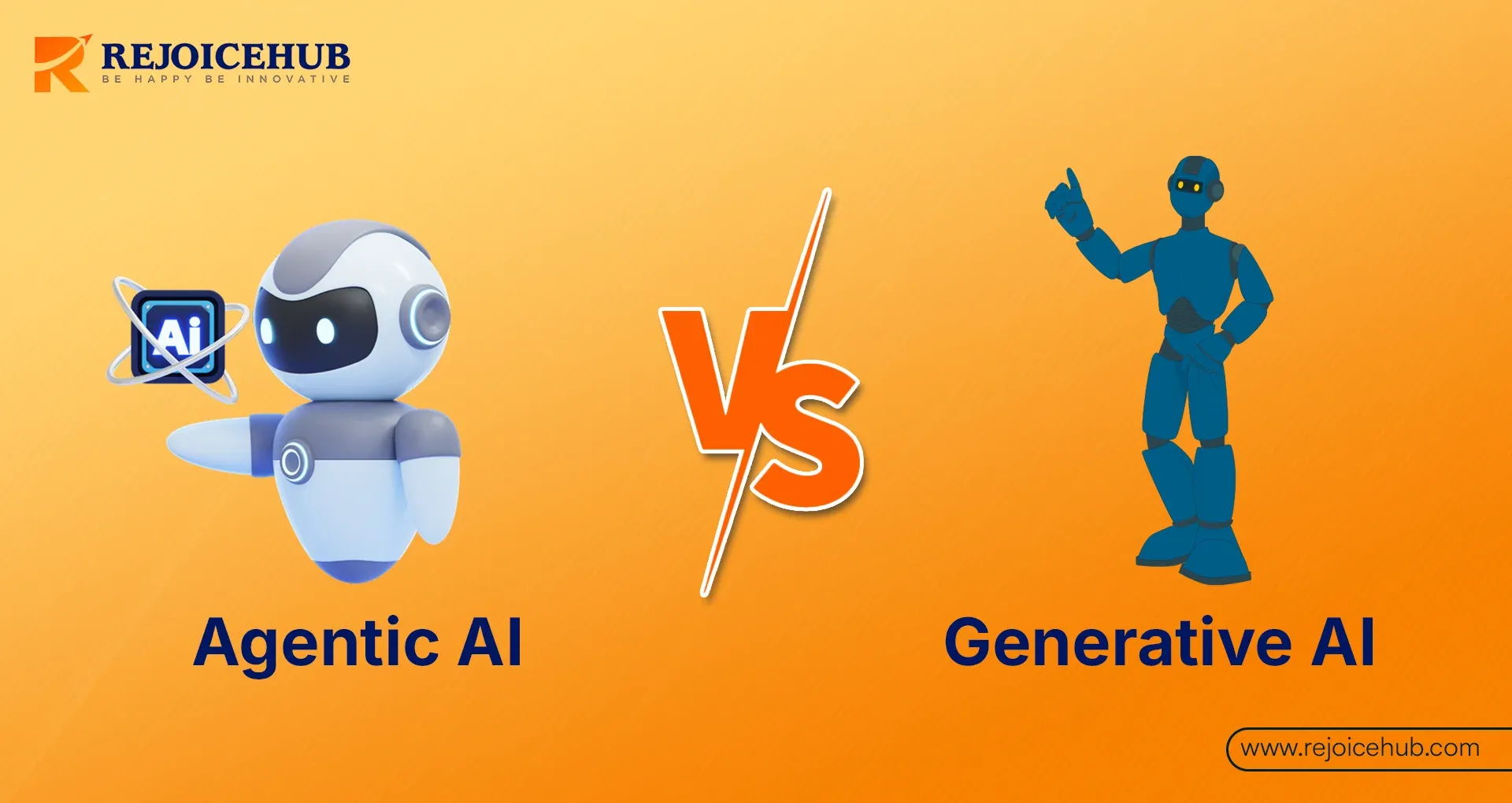
As we know, AI (Artificial Intelligence) is evolving at a rapid pace, and because of this, many new subsets of AI are being created for dedicated and specific tasks. If you have even the slightest interest in AI, you've likely heard the terms Generative AI and Agentic AI, but even today, many people don't know what they are.
And I've seen many people who think that all Artificial Intelligence tools are the same, but Agentic AI is very important in today's industries, and Generative AI in the creative sector, and many businesses today are based on them.
Generative AI and Agentic AI are quite different from each other, and each has its own benefits and usage sectors. In today's detailed article, we will try to understand Generative AI and Agentic AI in detail. To do this, we will test both on several parameters and finally explain which one is most impactful for today's industries.
Quick Summary
The market share of Artificial Intelligence in 2025 is $371 billion. This market share does not come from any single product or subset of AI, but rather is a valuation of numerous AI subsets. The two most popular subsets in the Artificial Intelligence sector today are Agentic AI and Generative AI. So, whether you work in the manufacturing sector or the creative field, you've likely heard of these two terms, and they're used in more than half of the tools available on the market for creative training and feature enhancement.
If we understand both through examples of tools, you can consider Jasper and Agentforce as Agentic AI, and LLM models like ChatGPT, Claude, or Grok as Generative AI. Agentic AI is most commonly used for customer support or repetitive tasks, and Generative AI is used to create new and creative content.
Our focus in this article:
1. What are Generative AI and Agentic AI, and how do they work?
2. What are the major differences between generative AI and agentic AI?
3. In which industries are they used?
4. What are the advantages and disadvantages of both?
5. Which subset has been the most impactful between generative AI and agentic AI?
What is Generative AI?
You can call Generative AI a type of Artificial Intelligence that is capable of creating new content, and it can generate content in the format of text, image, audio, video, or even code. If you have used ChatGPT, DALL-E, MidJourney, or Jasper AI, then you have practically experienced Generative AI, because these tools and platforms also use different subsets of AI.
I first used Generative AI for a blog writing idea, for which I needed a 2000-word SEO-optimised article, and it normally took me 6-7 hours to complete, but the Gen AI tool did the same work in just 15 minutes, and it gave me very detailed ideas for my article. Then I realised that generative AI not only increases the speed of work, but it can also take creativity to the next level if used ethically and productively.
Well, there are many Gen AI based tools in the market, which can instantly generate blogs, product descriptions or even paintings. Advanced generative AI can do Photoshop-like editing in seconds, that too without any editing experience. As good as these models are, they also pose ethical challenges. The value of many creative jobs has declined, and the market for editing software is declining, leading to the loss of many jobs.
Key Features of Generative AI
Over the years, we've seen many useful features in Generative AI. Let's take a look at some of its major features.

1. Data Analysis
Generative AI trains its models on various large datasets, using numerous sources from across the internet. It interprets billions of parameters to identify patterns and generate output based on these. Just as a trained musician understands every scale and note, Gen AI understands hidden patterns in data, stores them as structured data, and updates its learning based on different user interactions.
2. Content Creation
Its biggest strength is its ease of content creation, generating blog posts, product descriptions, ad copies, and email drafts.
I've personally seen many brands use AI models for their social media engagement, allowing them to create ad videos and image ads at significantly lower costs, resulting in significantly better advertising ROI.
3. Adaptability
Generative AI attempts to adapt to each user's input. For example, if you write in a serious tone or a fun tone, the generative AI model will interact with you based on your tone. This will help it determine your personality and even your current mood.
This is why Gen AI is considered perfect for personalised assistance or customer support.
4. Personalization
As we know, generative AI is quite perfect at personalisation. That's why brands like YouTube, Netflix, and Amazon use generative AI and Machine learning to recommend videos and products, providing you with videos and product recommendations tailored to your tastes.
This significantly enhances user experience and brand profitability, and generative AI plays a significant role in the back-end of all these operations.
Use Cases of Generative AI
Generative AI is used in many sectors for different tasks, and it is most commonly used by individual users for creative tasks. Let's explore the top use cases for Generative AI.

1. Marketing and Sales
Generative AI is used to create different market segments, such as ad campaigns, social media creatives, and personalized customer emails, saving them a lot of effort and money. And many of my colleagues say it has literally 5xed their marketing operations productivity.
E-commerce platforms like Amazon and Alibaba use Generative AI extensively for product recommendations and sales. They track user behaviour and provide product recommendations based on that information.
2. Content Creation for SEO
I personally use Generative AI extensively on SEO projects. Generative AI tools are particularly helpful in keyword-rich and blog drafting. Koch tools like Rank Math AI can even be used to assess schema-ready content, and this is largely due to Generative AI.
3. Customer Support Automation
Generative AI-powered chatbots are often used to respond to customer queries in natural language. And its best advantage is that it's available 24/7 and costs significantly less than human customer support.
Many businesses use AI automation to streamline customer support.
4. Product Design and Development
Generative AI is used in many sectors to generate 3D design prototypes, mockups, and even coding snippets, saving companies significant testing costs and speeding up the overall product lifecycle.
Trends of Generative AI
We've learned a lot about Generative AI. Now, let's explore current and future Generative AI trends.
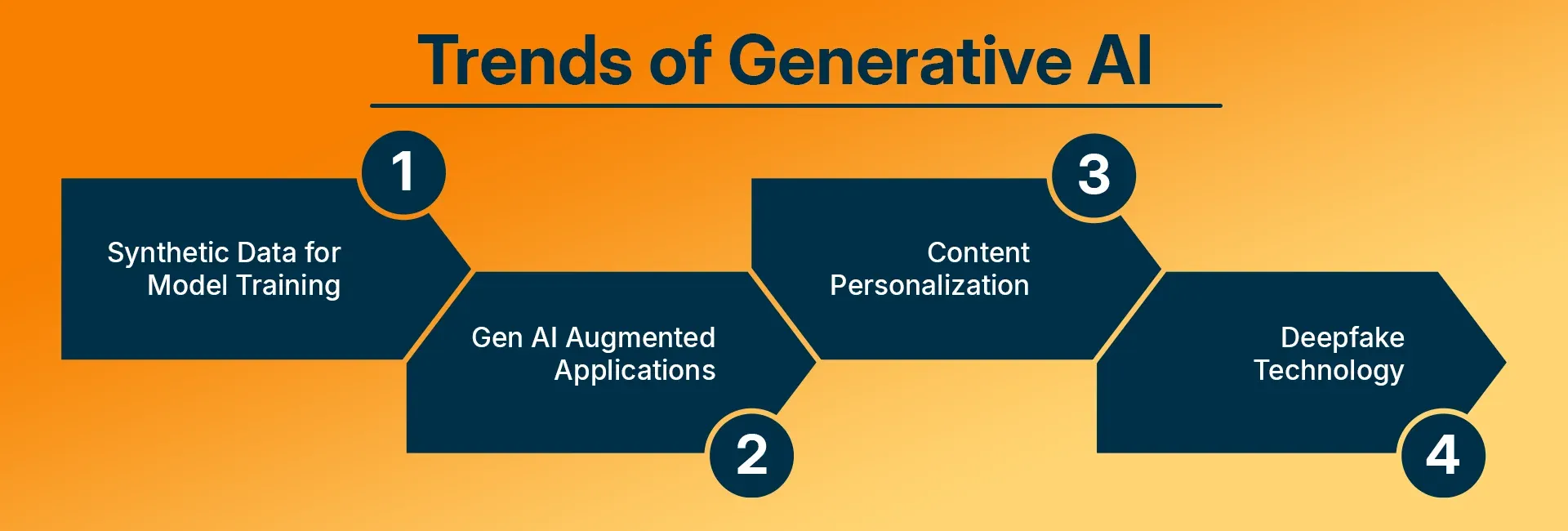
1. Synthetic Data for Model Training
AI companies are now creating synthetic data to train various models. This significantly addresses data privacy issues, significantly increases the accuracy of AI tools, and this technique significantly improves the accuracy factor of AI, significantly reducing the chance of errors.
2. Gen AI Augmented Applications
Gen AI is integrated into almost every software these days, and Google and Microsoft also use Gen AI extensively in their workspace tools. You already have Gen AI integration support in tools like Google Docs, Microsoft Word, Canva, and Photoshop. This increases work and creativity 10x.
3. Content Personalization
Gen AI is how users on streaming platforms are receiving hyper-personalised content, and platforms like Netflix are increasingly suggesting content based on their mood and preferences.
This enhances the overall user experience, and companies are finding that users are increasingly staying on their platforms.
4. Deepfake Technology
This is considered a fairly grey area, as deepfake crimes have increased significantly over the past year, with criminals using them to create ultra-realistic videos and voices, using them to defame and defraud people.
Some people are also using deepfakes for entertainment purposes. In the future, we can expect more government guidance related to deepfakes, which will reduce the misuse of AI.
Future of Generative AI
The overall future of Generative AI is quite exciting because we have only seen the beginning phase of Agentic AI, and many of the next generative models will be stronger than current ones.
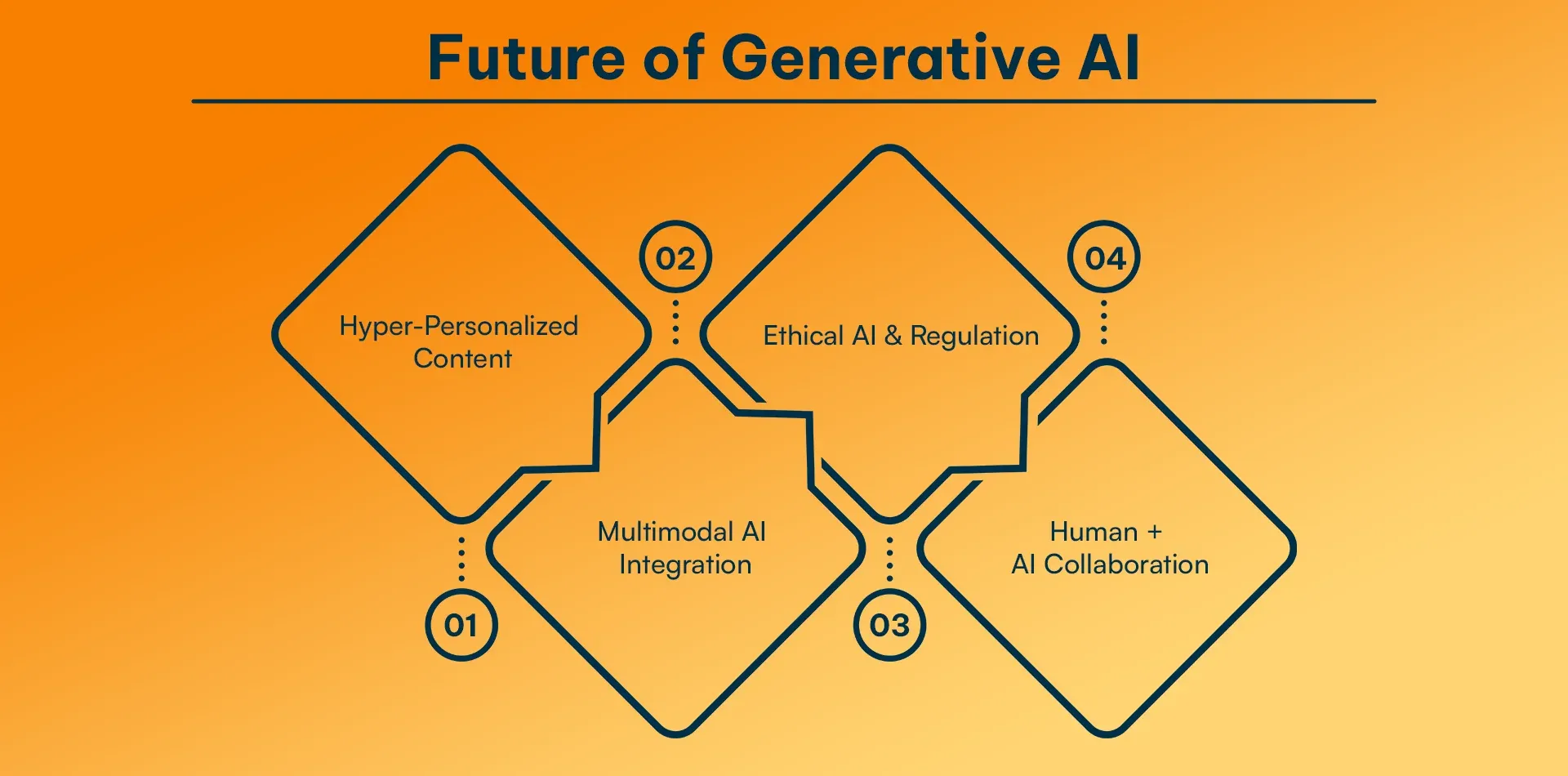
1. Hyper-Personalized Content
In the future, Generative AI will be able to create custom content for users, and Gen AI will be able to generate everything from simple blogs to complex articles. Gen AI can also explore browsing history and provide personalised recommendations based on user mood and interest.
You've likely noticed that whatever you view on an e-commerce platform, you frequently receive similar recommendations. This is largely due to Gen AI, and future models will be personalised and optimized.
2. Multimodal AI Integration
Today's Gen AI can mostly provide text- or image-based output, while future multimodal AI can generate text, voice, video, and even 3D designs simultaneously in a single model. This is why it will be increasingly used for content creation in the future.
3. Ethical AI & Regulation
As Gen AI evolves, the risk of misinformation and deepfakes will increase, which could lead to governments enacting stricter regulations for AI in the future. This could mean that only registered businesses and creators will be able to use advanced Gen AI, and access to such technology will be significantly restricted for the general public.
4. Human + AI Collaboration
According to me, generative AI will never replace humans; rather, it will serve as a partner to humans, working alongside them. It's certainly true that the market for repetitive and unskilled jobs will virtually disappear due to AI, but humans will still play an important role in jobs that require critical thinking and understanding.
As creators use it to generate more interesting and high-quality content, their work will become smoother and faster.
What is Agentic AI?
Now, let's understand Agentic AI. Agentic AI is a very new concept in the market, and you can call it a kind of new generation AI, which not only generates responses but can also decide on its own what the next step should be. And modern Agentic AI is reducing the processing time of many critical sectors.
Just imagine that you have a project, and that project is managed well by someone else. It sounds very interesting to hear, but Agentic AI can do this very effectively. Rather, Agentic AI can set deadlines and provide solutions for different operations accordingly.
Apart from this, Agentic AI is used for work in many different sectors. Agentic AI is quite new to the market, hence its monitoring is very crucial for maintaining accuracy.
Key Features of Agentic AI
Agentic AI is becoming increasingly popular in sectors like customer support, but it can play a significant role in many other sectors as well. Let's explore its key features.
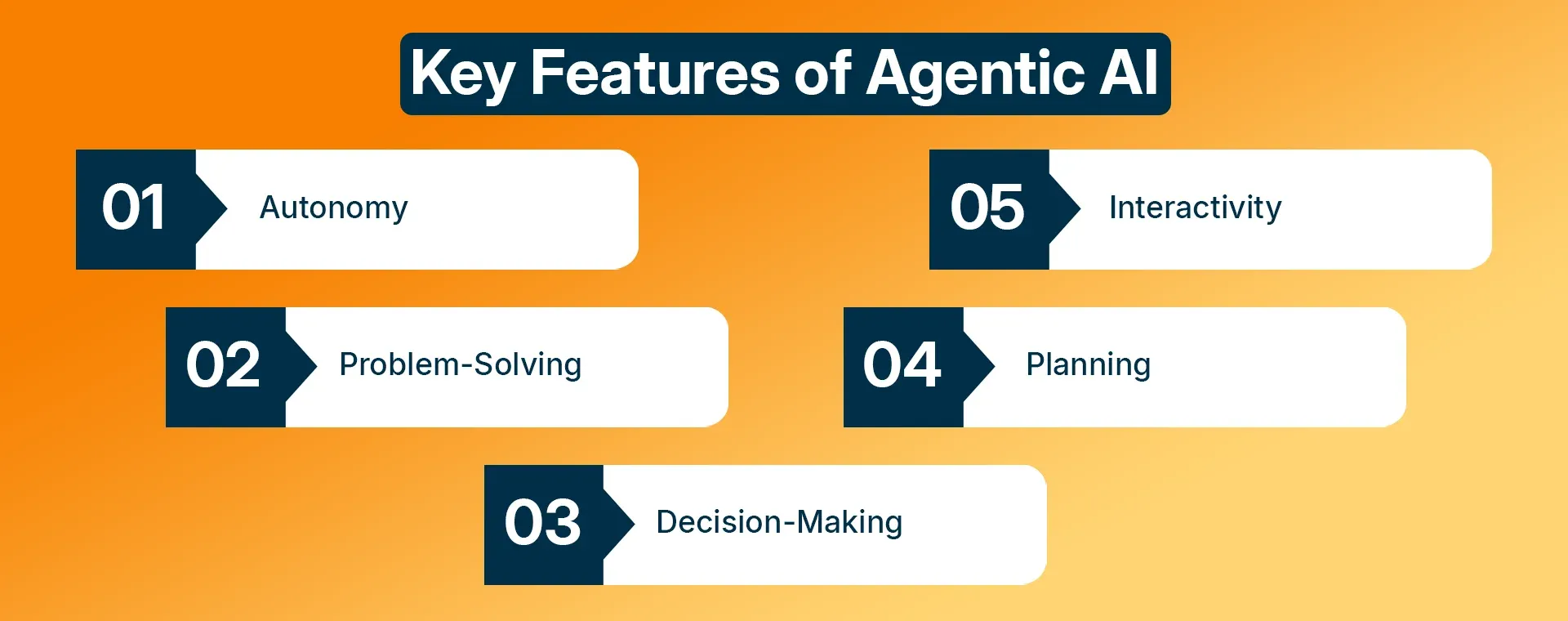
1. Autonomy
Most advanced Agentic AI can execute actions without human supervision, and this feature is why many businesses are opting for it. It can also independently determine its plans based on its goals, and most Agentic AI tools are quite suitable for industry standards.
2. Problem-Solving
If an e-commerce site crashes, agentic AI can troubleshoot and find solutions, even implement them automatically, without human intervention.
This gives human staff time to implement real solutions more effectively so that the issue doesn't recur in the future.
3. Decision-Making
Agentic AI makes smart decisions based on data, whether it's about investment strategy or insurance.
Many global companies like Binance use AI to make decisions in the financial sector, because the financial sector fluctuates greatly within seconds. However, AI can make very good decisions based on past data and current trends. Even many instant loan giving platforms use AI for perfect decision-making. With this, they can analyse a person's credit history in seconds, which is not possible for any human.
4. Planning
Many companies also use Agentic AI for long-term projects because it allows them to create long and precise roadmaps and ensures that they will be able to strategise their work to meet deadlines.
Many real estate engineers also use past records to determine the best location for a building's construction. Additionally, many businesses use Agentic AI for their decision-making.
5. Interactivity
As we know, Agentic AI can interact with the environment in real time and act accordingly. Self-driving cars are a prime example of this, constantly tracking road signals, traffic, and pedestrians, and using various sensors or Agentic AI algorithms, are capable of making decisions in real time.
The accuracy of Agentic AI is highly dependent on external factors, which is why most industries choose it for operations where external factors are less important.
Use Cases of Agentic AI
Agentic AI is used in many businesses; let's explore its top use cases.

1. Healthcare
Agentic AI is being widely used to diagnose diseases by analysing patient data. This saves doctors a lot of time and allows patients to receive the best treatment immediately. AI is also assisting in many surgeries.
In the traditional healthcare sector, many check-ups, tests, and symptom diagnoses are done by different doctors before treatment begins. However, machine learning or agentic AI-based medical agents can clear this process instantly.
2. Customer Service
As we know, Gen AI can only generate responses, but Agentic AI can solve flexible queries end-to-end. Agentic AI follows a flexible path rather than fixed rules, thus enabling flexible response times.
For example, if a customer requests a refund, the AI system will completely automate the refund process and automatically provide all the details instantly.
3. Financial Risk Management
Most large banks use Agentic AI for fraud detection, decision-making, and real-time risk assessment.
Agentic AI is also widely used in the stock market and loan process, for fast loan approvals or rapid share analysis.
4. Automated Workflow Management
Platforms like Agentforce can manage entire projects in the corporate world, whether it's task assignment, reporting, or even performance tracking.
In addition, agentic AI can also assist humans in many workflows, such as prescription printing and automatic clothing design.
Trends of Agentic AI
Many businesses are preferring Agentic AI to automate their repetitive tasks after 2024. Let's explore the top trends in Agentic AI.
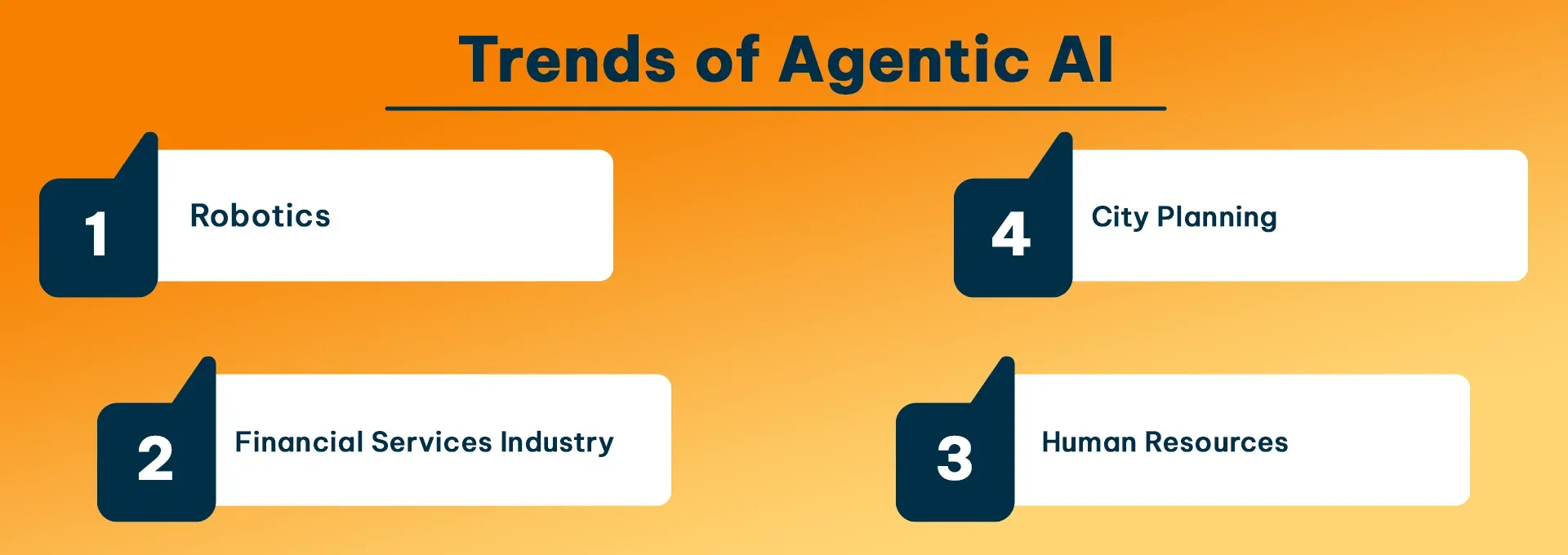
1. Robotics
As we know, Agentic AI is being used extensively in the manufacturing and logistics sectors, as companies prefer robots that incorporate Agentic AI.
2. Financial Services Industry
Many bots analyse the market and make decisions on their own, generating millions of dollars in profits for small investment and trading companies, and this is possible in a real-time world thanks to Agentic AI.
Banks like JP Morgan also use AI to automate and speed up the loan process, and for this reason, Agentic AI is being further trained for the financial sector.
3. Human Resources
AI is now being increasingly used in the hiring process, including screening resumes in the initial hiring process. Agentic AI is also being used effectively to automate performance reviews.
This makes the hiring process much faster and more efficient, and reduces the pressure on human staff.
4. City Planning
Cities like Singapore are also extensively using Agentic AI for smart traffic optimisation, significantly speeding up energy distribution, and Agentic AI even plays an important role in enhancing public safety.
Future of Agentic AI
Agentic AI has become popular in the market in the last two years, and many experts predict its future could be quite bright. Agentic AI can easily handle many repetitive jobs, and many new companies like Jasper will also enter the market. Let's learn about the future of Agentic AI.

1. AI-Powered Organizations
In the future, most companies will have AI agents that will make their workflow more productive and robust. Businesses will be able to manage everything from hiring to the financial sector through Agentic AI. In the future, AI may be able to easily handle 80% of a company's HR, Finance, and Project Management workload.
2. Smart Cities & Governance
Cities like Singapore have already proven how AI can be used in smart city development, and in the future, many modern cities will prefer Agentic AI for their traffic control, energy optimisation, and water supply management.
Many government sectors will use it for development, and this will generate billions of dollars in benefits for Agentic AI companies.
3. Human-AI Teams
Agentic AI can act as a virtual teammate, and users will turn to it for project management because it can handle many job roles on its own, even ahead of deadlines. You can also track all of this with Agentic AI. It can also effectively allocate resources and, most importantly, work 24x7, without holidays or salary.
4. AI Ethics & Safety Layers
The biggest challenge with AI, which has autonomy, is safety. In the future, as Agentic AI evolves, stronger rules will be created for security system parameters and data protocols, so that Agentic AI never makes harmful or biased decisions.
Key Differences of Agentic AI vs Generative AI
Let us understand the basic rules and working factors of agentive and generative through the table.
| Aspect | Generative AI | Agentic AI |
|---|---|---|
| Core Function | It creates new content (text, images, code) | It executes tasks with autonomy and decision-making |
| Focus | Creativity & Expression | Action & Problem-Solving |
| Examples | ChatGPT, MidJourney, Jasper AI | Self-driving cars, AI project managers |
| Use Cases | Marketing, SEO, Customer Support | Healthcare, Finance, City Planning |
| Output | Content & Ideas | Decisions & Actions |
| Human Role | Needs input & guidance | Works independently with minimal input |
Conclusion
Generative AI and Agentic AI are still in their beginning stages and will evolve further in the future. If we define Generative AI in simple terms, it can be described as a creative assistant that can convert your ideas into content, whether in text, image, or video format. Agentic AI can be described as an intelligent manager that can make decisions and complete tasks on its own. Therefore, it is being used in many sectors for customer support.
Both AI subsets have their own importance and market uses, but if we had to choose the most impactful subset, I would choose Generative AI because it has virtually transformed the creative sector, allowing hours of work to be completed in seconds, but this has also led to the loss of many skilled artists.
Overall, both subsets are significantly helping humans in various sectors. If you want to use AI in your business to automate repetitive tasks, then RejoiceHub Firm can be a great option for you, because they can help you with everything from custom solutions to final deployment.
Frequently Asked Questions
1. What is the biggest difference between Generative AI and Agentic AI?
While we see many differences between the two, the most significant difference is that Agentic AI can automatically handle and execute tasks and make decisions, while Generative AI cannot execute any tasks on its own.
2. Is Generative AI Safe?
Generative AI models trained by large companies are generally considered safe because they strictly adhere to government regulations. Furthermore, for greater safety, it is crucial that AI is used ethically.
3. Where is Agentic AI currently being used in the real world?
Currently, Agentic AI is being used for critical, real-world projects such as healthcare, finance, robotics, and smart city planning.
4. Will Generative AI replace jobs?
I believe that Generative AI will replace many repetitive and low-effort tasks for humans, as Generative AI can handle simple creative tasks quite well.
5. Will Agentic AI work completely without human control?
The top Agentic AI currently available is capable of handling many critical tasks on its own, but companies continue to monitor Agentic AI to improve safety and security.
Q6. How does Generative AI help with SEO?
Using Generative AI, you can find keyword-rich content or keywords for your blog or article. You can also use it to create FAQs or blog drafts. Even SEO tools like SEMrush are incorporating AI support into their platforms.
Q7. What does the future hold for Agentic AI?
The future of Agentic AI is promising because it will automate many industries, but it will also create many problems, such as low security and the loss of many jobs, which will bring significant challenges to the market.
